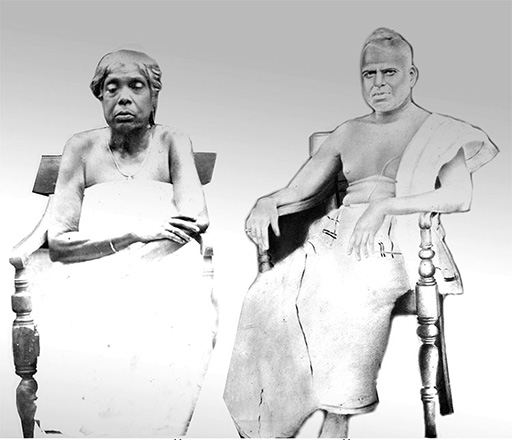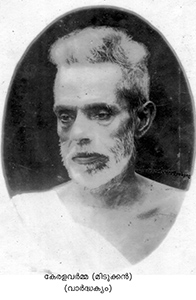Kerala Varma Midukkan Thampuran He was the son of Kavu Thampuran and Ashtamoorthi Kuttan Namboodiripad of Pana Mana. He was the immediate brother of the Raja who died in Madras. Midukkan connotes to the adjective ‘extremely smart’. Late Ikkavu Thampuran who was a grandniece of the Raja elucidated further in the 2002 Symposium of the Cochin Royal Family Historical Society. A learned Nambuthiri scholar visited the parents of the young Prince. He was quizzing the Prince who was only eight years old about his prodigious skills in memorizing Sanskrit texts and verses. The Scholar was overwhelmed by the prowess of the youngster and blessed him in the conventional manner with both hands on his forehead and said ‘Midukkan! Midukkan! Midukkan!’

His parents: Kavu Thampuran and Kuttan Namboodiripad of Pana Mana
.jpg)
Raja with his consort Lakshmikutty Amma
He had Basic English education, could speak fluently in English and was as progressive as his elder brother. He was a scholar in Sanskrit and an expert in Ayurveda with concentration in Visha Chikilsa. Not only was he an expert but practiced the art and science of Ayurveda Medicinal treatment among the local residents for a long time. This endeared him to the public. He married V.K.Lakshmikutty Amma of Vadake Karimpetta Tharavad, and had four sons and one daughter.
It is said that he became disinterested in his duties as a Raja and became a recluse and delegated many functions to his sons who were educated in England and to his wife who was an extraordinarily gifted woman.
After Shanmukham Chetty left, Mr.A.F.W.Dixon, CIE. ICS became the Dewan. Opening the Budget Session of the Cochin Legislative Council on Monday, 27th July, 1942, he made the following remarks.
1. He spoke about the Second world war that was going on and what grave peril that will be if Germany was not defeated.
2. He reminded of the devastating effect of the cyclone that hit the State of Cochin in May 1941 and how it affected the coconut crop.
3. With the entry of Japan, Cochin indirectly has been affected as the paddy fields of Burma fell into enemy possession.
4. He wanted to conserve the resources of the State by exercising economy of expenditure. The State depends so much for its revenue on receipts from Customs and the Railway, which are liable to violent fluctuations in war time.
5. He at the same time impressed on the need for ‘nation saving’ efforts which may be construed as ‘nation building’ activities.
6. Accounts of the year 1941-1942 showed a surplus of Rs 12.04 lakhs. Actual Revenue was 121.46 lakhs. For the ensuing year, a budget of revenue of Rs 124.36 lakhs and an expenditure of Rs 121.61 lakhs was projected.
7. His speech was in depth in planning, execution and analysis. Several passages will be quoted: “ Government fully realized the difficulties to which low paid Government servants were put due to the rise in cost of living and a dearness allowance of RS 1 to Government servants drawing a pay of Rs 25 and below was sanctioned from the 16th December, 1941. Subsequently due to a further substantial rise in prices this was increased to Rs 2 from the 15th of June 1942. The cost will be Rs 57,136 in 1117 ( 1942 ) and Rs 1,71,408 in 1118 ( 1943).
8. “ Before passing on to the absorbing topic of rice control, which has been so much in our minds of late. I will make brief references to the largest of all our departments, that of Education, and to the oldest, The Revenue Department. Cochin shares with Travancore the honour of being the most advanced area educationally in India, but one aspect of education in this State has made little progress. I refer to physical education, which is now generally recognized as being a vitally important element in any properly designed system for training of youth. The importance of physical education is particularly obvious at this time, when young men, and women too, sound in mind and limb, are required for work of all kinds in defence of their country. Hence it is that arrangements have been made for the appointment of several fully trained physical instructors in high schools for the training of 8 more in the college of Physical Education in Madras, for the acquisition of lands for playground and for appointment of a playground committee to make a regular survey of Ernakulam, Mattanchery and Trichur and submit recommendations regarding playing space for colleges and schools.
9. Regarding the status of the Revenue department, he said that payments were made to alleviate the heavy losses caused by the cyclone. Remission of rent on fisheries were given to alleviate losses resulting from the closure of the Burma prawn market. A very important bill named ‘ The cochin verumpattomdars bill has been introduced to give fixity of tenure to verumpattomdars. There would be legal protection for them being evicted or sued.
10. Regarding the issue of rice procurement, he said that when Japan entered the World War, rice was procured from Burma to a very large extent because the Government did not want people to experience rice scarcity. Then when import from Burma stopped, the Government launched a ‘ grow more food crops’ campaign, by providing for the leasing of available State lands to grow food, loans at reasonable terms, distribution of seeds and plants and other measures to induce or compel landlords to cultivate food crops. The Government also imposed price controls and warned merchants against hoarding. In addition, rice was imported from Tanjore and transportation difficulties were being addressed and other rice producing States are helping out. Friendly agreement reached with Travancore has been helpful regarding the rice problem.
11. As with rice, kerosene and sugar scarcity had to be dealt with State price control and rationing.
12. In my opinion, the primary duty of Government, after providing for defence and for law and order, is ensure so far as lies in their power that every man, woman and child in the State has a sufficiency of the bare essentials of life, and starvation or semi- starvation is reduced to minimum or banished altogether. The maintenance of the health and strength of the people is also a vital war need..........We must all of us see to it that there is no slackening in the drive to reduce unemployment and destitution. In this important effort we have the strongest support and encouragement from His Highness the Maharaja who has devoted his whole life to the service of his fellow men, and who is more anxious even than any of us that his subjects should enjoy happiness and prosperity, and that none of them should suffer from want.”
13. Dewan concluded the remarks this way: “ So Cochin has made, during the year, a good contribution to the war effort of the United Nations, but we should endeavour to do still more. As loyal subjects of His Highness, who has shown in such unmistakable fashion his devotion to the cause, let us determine each and all of us to spare no effort to give of our utmost in personal service. There are many ways in which we can help towards victory. The more obvious are to serve in the defence services, or armament factories, to subscribe liberally to war funds or to war loans, or to make propaganda speeches, but there are many who can do none of these things. They too can help just as surely in an infinite variety of ways. The cultivator who grows more food crops, the dock worker or the railway man who makes an extra effort to speed up the transport of goods, the ordinary men and women who remain calm and steady when others panic, the Government servant who cheerfully does his extra hours of work, are all helping to win the war. Time is passing, and time is all important in this war of humanity against barbarism. This is the first war in history in which no one in the world can afford to be neutral. It is a war which will decide the future of a planet. It will decide whether the human beings on this earth are to be allowed to live their own lives and call their souls their own or whether they are all, except a chosen few, to become regimented slaves, condemned for many generations to toil unceasingly for the benefit of a so –called master race which has shown itself to be barbarous, pitiless and inhuman.”

The State was consumed with the activities of the Central war committee and the war publicity department. Maharaja sent a message to the Viceroy as soon as the war broke out..” In this hour of crisis I place the resources of my State at the disposal of His Imperial Majesty” – Rama Varma G.C.I.E; L.L.D. The pledge was repeated by the Maharaja Kerala Varma G.C.I.E on the occasion of the installation on 23
rd May 1941. He said “In the epic fight against the forces of evil, victory is bound to come to those who fight for the establishment of justice and liberty.”
Dewan Dixon was the President of the Central War Committee. The eldest son of the Maharaja, V.K.K Menon, Bar-At-Law was the main war publicity officer and Rama Varma Appan Thampuran was the assistant officer. The office produced a great publication “COCHIN” and it provided valuable information about the State. Maharaja passed away at Tripunithura on the 13
th October 1943 after being on the Musnad for a brief period of two years. His consort who was ailing at the time, passed away within 5 days of Maharaja's demise.
Digitized Documents from the British Library in London....A glimpse into the administration: A Police Strike in Cochin State...how it was quelled, how citizens pettitioned the Dewan; how Dewan ordered a new Police Chief.. an European or a Muslim; and Raja writes.." Purely for reasons of economy I prefer a Muslim ( because European officers would have cost more to the State treasury.)
Digitized Documents from Britsh Library in London CLICK HERE

.jpg)
